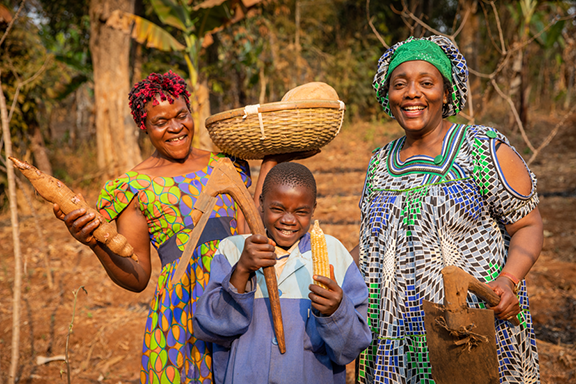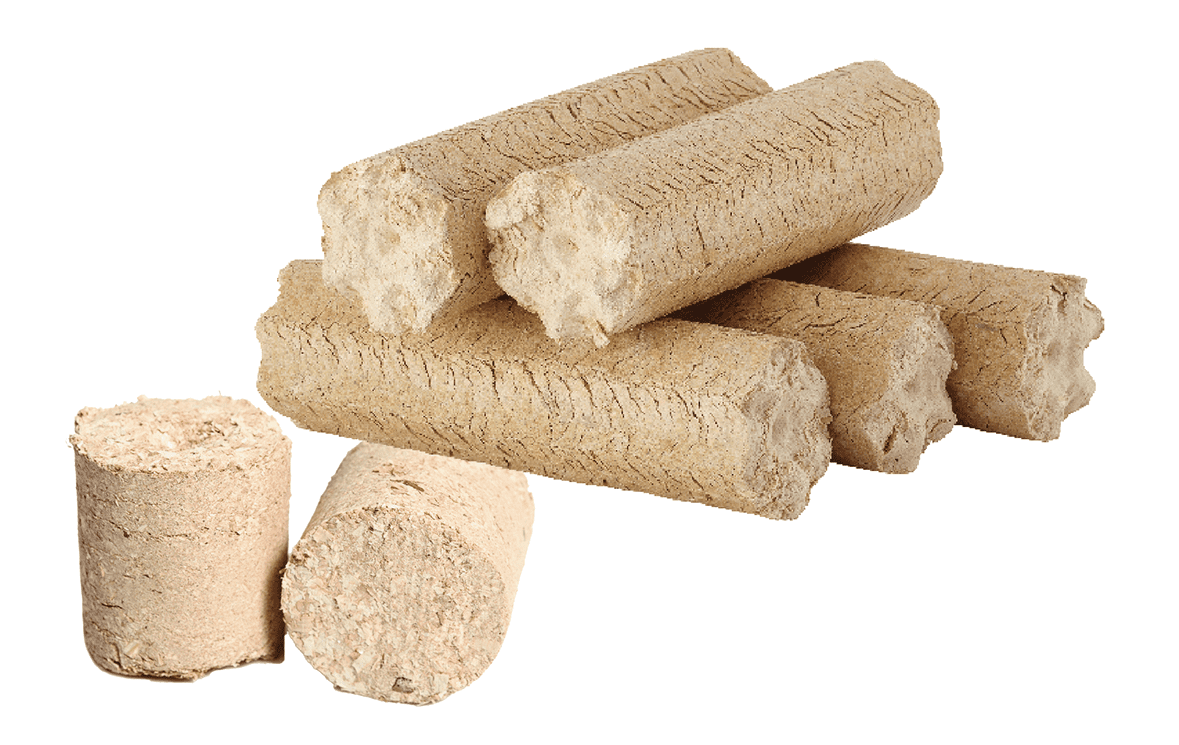Viany Thatte has been working in East Africa for over 15 years and, during that time, he says he “came across the huge piles of bagasse [the dry, pulpy residue from sugar cane] left by the sugar industry and destined to go to landfill.” He watched as an increasing amount of waste was being dumped into the landfill over time and thought, “Why are people not recycling these items, and why are they not looking at waste as a source of raw materials?”
He consulted with briquette manufacturers, and it became clear to him that proper processing of those materials could not be done with the technology that was being used at the time, and that serious study of the equatorial crops would need to be conducted to adapt the briquetting machinery. He began to offer his expertise to the few existing briquette manufacturers and continued to conduct studies “to find the market potential.” He found that the monthly demand (35,000 tons) and amount of available raw materials (95,000 tons) far outweighed the amount being produced (1,700 tons). That is when he “decided to set up a serious manufacturing facility, the largest in Kenya, and create a sustainable circular economy model.”
While doing business in East Africa, he had become acquainted with Henrik Mahaele and Martijn De Kock and they began Alkebulan Greens Energy Limited.
Thatte, the chief operations officer, says, “Alkebulan is a company established in Kenya with a manufacturing facility in Kakamega County. This is a waste to energy initiative. We collect sugar industry waste bagasse and agro-forestry waste from various farmlands, county dump and yard biodegradable waste. This is then collectively passed through a battery of seven machines that clean, dry and shred the materials, making them homogeneous before being briquetted.”

The company contributes to a greener planet by reducing greenhouse gas (GHG) emissions by 5,000 tons annually and by saving more than 200,000 trees. It creates further sustainability by using the energy and heat made by its industrial processes in house. It boasts its dedication to skills development for its employees, leaving each employee with more knowledge than they had prior to being with the company.
Alkebulan makes a point to empower and provide opportunities for the women in Kenya. According to the Neema Project, a group focused on improving the lives of young women in rural Kenya by providing counseling, skills training and discipleship, severe material poverty disproportionately impacts women in rural Kenya which can, oftentimes, lead to their victimization. Forty-three percent of these women have reported firsthand discrimination based on their gender in regard to their professional and personal lives and schooling. A shocking 78 percent of young adolescent Kenyan girls report feeling signs of severe stress or depression.
Alkebulan is determined to be part of the solution by hiring women at the same rate that it hires men. Access to resources will provide unlimited positive change for their lives and the lives of their families.
Thatte says, “Alkebulan has a 100 percent Kenyan team on the ground, and the higher officers and directors are also Kenyans.” It has 50 full time workers, none contractual, 20 of whom are women working across finance, marketing, production, operations and maintenance, and the “canteen is managed by women who are educated in nutrition and hotel management.” Unlike its competitors, Alkebulan “has a corporate social responsibility (CSR) in place which offers free food and medical facilities to employees and free cattle feed/animal fodder and organic fertilizers to small stakeholder farmers in the vicinity of the facility.” It also offers domestic cooking pallets to some local households, free of charge.
“The majority of these small-stake farmers are women, and cooking is done by women in Kenya,” Thatte says. This directly implies that, in addition to 20 full-time women employees, Alkebulan also takes care of about 300 women in the vicinity of the manufacturing facility to empower them and uplift their livelihoods, which in turn helps them support their children.
Briquettes can be used in place of firewood and charcoal to create heat or energy for industrial processes. According to the United Nations Framework Convention on Climate Change (UNFCCC), processing organic waste versus allowing it to decay is also beneficial because decaying waste creates methane gas which is harmful to the environment. Regions with high deforestation can also benefit from burning briquettes over firewood, so that the forests can continue to absorb carbon.
Thatte points out, “A ton of these “activated” briquettes saves 11 trees used for combustion, and the other products help increase soil resilience and boost yields, making these products more sustainable and helping to reduce GHG levels at every point of use.”

As soon as Alkebulan receives the organic waste, it begins using automated processes to create its products. During the day, the materials are dried using a solar incubation process and, at night, heat from the bio-digester – a closed system that either aerobically or anaerobically digests organic material – is redirected to continue the drying process uninterrupted. The disintegration and separation of particles is also done by a machine, then the material is compressed, ground and dried again. The resulting materials are compressed into pellets and briquettes then cooled and packaged.
“The briquetting machine then produces briquettes and pallets suitable for burning in industrial boilers and domestic or institutional cook stoves,” Thatte explains. “The process is state of the art and fully automated, meaning it is capable of running 24/7, 365 days, making us the largest manufacturer of these briquettes. The remains of the process are converted to animal fodder and cattle feed, and the secondary fines discharged are blended with water hyacinths, animal dung and human dung, which go into the bio-digester to produce cooking gas, electricity and organic fertilizers. The waste heat generated is then drawn back into the process for drying of raw materials. This makes Alkebulan’s model completely circular, with zero waste discharge to the environment.”
 Alkebulan believes its briquettes are preferable to its competitors for several reasons: A higher calorific content leads to a higher energy content (more heat), and its briquettes have a calorific value (Kcal/Kg) of 4,400 to 4,800 compared to others at 3,200 to 4,400, which means they also have a lower ash content of about five percent compared to seven to 10 percent, leading to longer burn times. Fifteen percent less of Alkebulan’s briquettes will produce the same effect.
Alkebulan believes its briquettes are preferable to its competitors for several reasons: A higher calorific content leads to a higher energy content (more heat), and its briquettes have a calorific value (Kcal/Kg) of 4,400 to 4,800 compared to others at 3,200 to 4,400, which means they also have a lower ash content of about five percent compared to seven to 10 percent, leading to longer burn times. Fifteen percent less of Alkebulan’s briquettes will produce the same effect.
According to Thatte, everything that Alkebulan does sets it “apart from other biomass fuel producers – from the technology, the scale we speak about, a model of circular economy with zero waste generation and, to top it all [off], the CSR which we have in place. It’s the work culture and ethics at Alkebulan that score high. The long-term vision of the founders is to establish Alkebulan as a reputable and large player in this field, keeping the morale high. Customer relationships are managed through web applications, enabling customers to track their order production, quality analysis, delivery schedules and dispatches on a live basis. We also provide after-sales support for boiler consultancy, if required, [which I head as] the COO. This combined and transparent approach to customer relationship management is unique in the market.”
Not only is Alkebulan dedicated to transforming the briquette industry, but the Kenyan energy landscape as a whole, with the added commitment of creating a positive social impact.
Photos courtesy of Alkebulan Greens Energy Limited.
Shannon West graduated with a Bachelor of Liberal Arts in Psychology from Texas State University, where she developed a knack for writing research papers and case study analyses. After years of helping friends edit their university papers and cover letters, she is now putting those skills to use by copy editing and writing here at OILWOMAN Magazine.
Oil and gas operations are commonly found in remote locations far from company headquarters. Now, it's possible to monitor pump operations, collate and analyze seismic data, and track employees around the world from almost anywhere. Whether employees are in the office or in the field, the internet and related applications enable a greater multidirectional flow of information – and control – than ever before.



